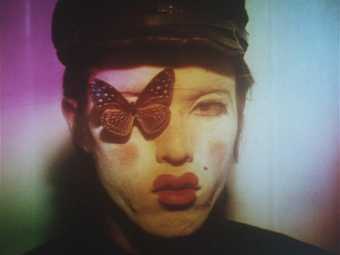Tokyo Puck was a full-colour satirical journal that mocked an infatuation with western behaviour and ornamentation in the Taisho era of the 1920s. Terayama inverted its popular, vernacular style to fashion a world of artifice and self-conscious aestheticism in Butterfly. The setting is like the dressing room of a theatre where masculinity is feminised and destabilised in an orgy of luscious colour, caked face makeup, shadows and figures obscuring the screen; the Taisho era gleefully reconstructed as a modernity of increased intensification and consumption. This programme reconsiders Terayama’s ambivalent use of cultural memory through a grouping of works that approximate the elements of a seditious book of manners.
The BBC Arena documentary TENJO SAJIKI: Children of God heralds Tenjo Sajiki’s 1978 London debut with a play derived from Jonathan Swift’s 18th-century manual of etiquette, Directions to Servants. In his introduction to the production Terayama wrote about a mechanical device called the ‘Saint-Master Machine’, which appears onstage: ‘It places a wig on to a bald man’s head and gives him a moustache, thereby making him a "Master". It seems that any Servant could become a Master with the aid of this Machine.’
In An Attempt to Describe the Measure of a Man, Terayama depicts the remonstrations of a Tom Thumb character as he falls in love with a bubble-girl, and lingers on the image of her humongous body. The more he contemplates the less he lives, exclaiming ‘One day I will let you out of the screen, Mona!’ before his infatuation with the ephemeral newness of motion pictures is satisfied.
TENJO SAJIKI: Children of God
Nigel Finch, 1978 United Kingdom, 16mm transferred to video, 25 min
Butterfly (Chōfuku-ki)
Shūji Terayama, 1974 Japan, 16mm, 12 min
An Attempt to Describe the Measure of a Man (Issunbōshi o Kijutsusuru Kokoromi)
Shūji Terayama, 1977 Japan, 16mm, 19 min
Curated by Thomas Dylan Eaton in association with Tate Modern.
With generous support from Daiwa Anglo-Japanese Foundation, Japan Foundation, Sasakawa Foundation, Toshiba Foundation, and All Nippon Airways.
Tate Film is supported by Maja Hoffmann / LUMA Foundation.

